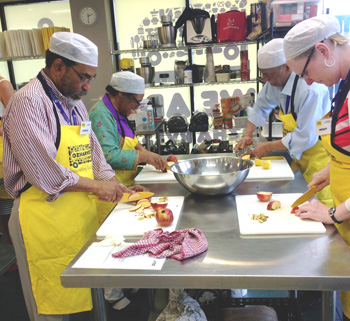- Posted in All University
- Category: Campus News
Faculty Development in Sustainable Business
LINCOLN UNIVERSITY, Pa. – A business professor at Lincoln University learned how some of Australia’s leading organizations apply sustainable business practices as part of a faculty development program in January.
Oswald H. Richards, professor and director of the Master of Science in Business program, participated in the fifth annual Sustainability Imperative offered by the University of Queensland in Australia and the Center for International Business Education and Research at the University of Connecticut.
 Oswald Richards (left), a business professor at Lincoln University, works at a food bank preparing recycled and donated food products for delivery to the homeless, refugees, and indigent peoples on January 4, 2017, during a community service learning project with faculty members and University of Queensland administrators in Australia.
Oswald Richards (left), a business professor at Lincoln University, works at a food bank preparing recycled and donated food products for delivery to the homeless, refugees, and indigent peoples on January 4, 2017, during a community service learning project with faculty members and University of Queensland administrators in Australia.“We need to broaden the context of business education beyond Eurocentric paradigms, which dominate business literature, textbook and scholarship,” Richards said. “The trip is an important exposure and additive to business and cultures in the Asia-Pacific region, which is indispensable in a globally interconnected and integrated economic, financial, political, social and technological world.”
Through company visits, cultural excursions and networking opportunities, Richards said he has broadened the context and scope of his business education that he continues to leverage for the benefit of his students, the institution, and its constituents.
Faculty in business, engineering, economics, and international studies from the University of Connecticut, University of South Carolina, University of the Virgin Islands, Southern University A&M, and Howard University visited business and government agencies in Sydney and Brisbane to meet with industry experts and hear first-hand how real-world organizations are planning for and meeting the sustainability challenge.
The two-week program took participants to Sydney, Toowoomba, and Brisbane-- three cities that represent a demonstrable microcosm of Australia’s green sustainability initiatives. They explored how climate change is impacting all areas of business management and learned about the role new technology, energy resources and the carbon economy will play in a changing business landscape.
“The country’s multitudinous infrastructures are mobilized to promote, practice, implement and execute strategies that foster recycling, carbon emissions reduction and innovation in green technologies,” Richards said.
Participants explored Australia’s unique cultural heritage and witnessed the sustainable use of limited Australian resources. During a community service learning project, faculty members and University of Queensland administrators worked at a food bank preparing recycled and donated food products for delivery to the homeless, refugees, and indigent peoples.
The group also visited the Muru Mitigar community center to interact with the local aborigines and engage in cultural activities including games, music and rock art painting.
Richards said Australia has made impressive strides in applying sustainability practices in public and private sector enterprises.
Article by Shelley Mix. Photos courtesy of Oswald Richards.